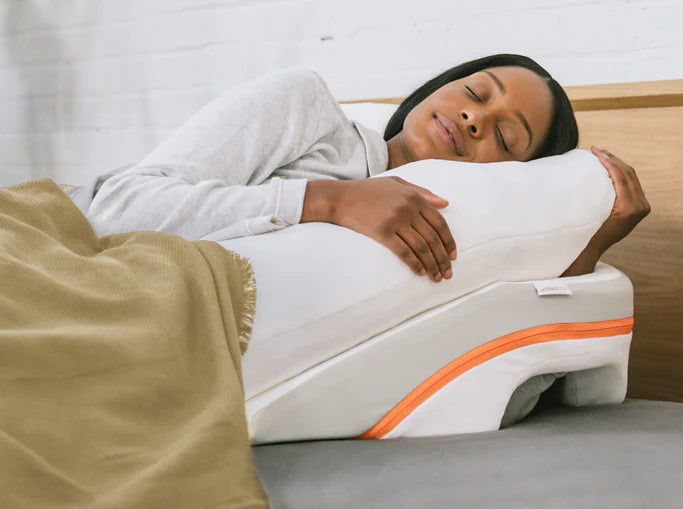Your Cart is Empty
YOUR CART
Your cart is empty!
Add your favorite items to your cart.

How to sleep with Acid Reflux & Heartburn
Many people don't realize that the position you sleep in can directly affect your acid reflux symptoms at night. Anatomy and gravity play a significant role in heartburn symptom frequency, length, and severity,so learning how to sleep with acid reflux can offer substantial relief.
In this post, we'll discuss the relationship between sleep and reflux symptoms and describe how to sleep with acid reflux. We'll also share tips for optimal sleeping with heartburn, acid reflux, and GERD. To navigate the article, click one of the links below or read through it for a comprehensive overview.
- Symptoms and Causes of Acid Reflux
- Why is Acid Reflux Worse at Night?
- How to Sleep With Acid Reflux & Heartburn
- The Best Sleeping Position for Acid Reflux
- How to Sleep Acid-Reflux-Free
- Key Takeaways
Symptoms and Causes of Acid Reflux
What causes acid reflux and what does it feel like? Let’s start with a short anatomy lesson.
What you eat travels down your esophagus through your lower esophageal sphincter (LES) and into your stomach, where digestion begins. Your LES is a ring of muscles that act as a valve to control what flows between your esophagus and your gut. If your LES functions correctly, what you eat will stay in your stomach with the occasional release of gas.
Problems arise when your LES doesn’t function properly, allowing the contents of your stomach to escape into your esophagus. These problems can appear as uncomfortable physiological symptoms, such as:
- Heartburn
- Regurgitation
- Choking
- Coughing
More severe problems, like gastroesophageal reflux disease (GERD), occur when reflux goes untreated. Prolonged acid exposure potentially leads to serious health complications, such as erosive esophagitis, peptic strictures, esophageal ulcerations, Barrett’s esophagus, and, in rare cases, esophageal cancer(1).
How does acid reflux affect sleep?
Acid reflux issues can appear throughout the day, but many individuals may find that they intensify at night or will experience acid reflux in the morning,leading to physical discomfort and, as a result, poor sleep.

Why is Acid Reflux Worse at Night?
Does acid reflux get worse at night? For some, it can. Here's why.
If you're experiencing reflux while standing up, gravity and saliva quickly return the acidic content to your stomach. This fast return typically minimizes symptoms. It also reduces the possibility that acid will damage the delicate lining of your esophagus.
However, when you lie down, you swallow less, making the return of reflux to the stomach more difficult(2). This combination of factors can cause some to struggle with acid reflux more at night.
The discomfort ofnighttime acid reflux(9) symptoms can disturb your sleep and lead to poor sleep quality.

How to Sleep With Acid Reflux & Heartburn
The good news is that you can learn how to comfortably sleep with acid reflux by adjusting your sleep position at night. These simple modifications can go a long way in reducing yournighttime acid reflux symptoms. Which side you lay on for heartburn can also protect you from the harmful long-term effects of refluxed stomach acid.
Below, you’ll find which postures you should avoid paired with adjustments. Here are the best and worst sleeping positions for acid reflux.

Avoid sleeping flat on your back
A poorly functioning LES can allow acidic stomach contents to flow freely into the esophagus when lying flat on your back. As a result, this position can exaggerate acid reflux at night.
Studies have shown that symptoms are often more frequent and last longer in this sleeping position(3). The severity of your symptoms may also increase if you have stomach fat, which pushes down on your stomach and LES, forcing contents back up into the esophagus and beyond. To reduce your nighttime heartburn and the risks associated with prolonged acid exposure, try to avoid sleeping on your back at night.
Instead, sleep at an incline
A simple boost in elevation can produce positive results when it comes to nighttime acid reflux. Studies have shown that sleeping at an incline decreases the frequency of reflux episodes and allows your body to clear reflux faster (5).
As long as you elevate your entire torso, the incline encourages gravity to return reflux to your stomach.
Avoid right-side sleeping
Episodes may be less frequent on your right side than flat on your back. But they're much more liquid because your LES is often submerged in the acidic stomach content(4). When you sleep flat on your right side, your body has to work harder and longer against gravity to return acid contents to your stomach. This position potentially creates a leaky faucet sensation, releasing stomach acid into the delicate lining of your esophagus.
While liquid reflux can be very distressing, it can also be dangerous — when you lie flat on your right side, acid tends to linger in your esophagus for much longer(3). As stomach acid idles in the esophagus, it continues tocause irritation and inflammation(10) and can lead to ulcers,chest pain, bleeding, trouble swallowing, and other serious issues.
Instead, sleep on your left-side
You may have heard that sleeping flat on your left side provides heartburn relief, which is true. In this position, your LES typically stays above “sea level” or above the level of gastric contents, making refluxing more difficult. Should stomach acid escape, gravity can return it to your stomach quicker than when you’re on your right side (6-7).
Reflux on your left side also tends to be more gaseous (4), decreasing potential damage from acid exposure. Because symptoms tend to be milder and less frequent when lying on your left side, this sleeping position is considered best for acid reflux and other gastrointestinal disorders like GERD.
The Best Sleeping Position for Acid Reflux
Given the information above, the best sleeping position for acid reflux is on your left side and at an incline. This posture has been proven to offer natural relief and can make refluxing nearly impossible, thanks to the positioning of the lower esophageal sphincter(6-7). When the LES is above the level of your stomach contents, gravity can quickly return the contents, like partially digested foods and acid, back to your stomach. As a result, you’re less likely to experience acid reflux at night.

Physicians suggest that this elevated left-side position can decrease your nighttime heartburn symptoms and provide protection from prolonged acid exposure to your esophagus, throat, lungs, and sinuses.
How to Sleep Reflux-Free
Using a science-backed sleep system can help enhance the effectiveness of doctor-recommended sleeping positions. For example, theMedCline Reflux Relief System raises your entire torso and esophagus 15 to 20 degrees, helping to reduce painful nighttime GERD symptoms. This product is designed to address the needs of those experiencing acid reflux at night. Unlike other sleep pillows, our clinically proven Reflux Relief System is designed with a patented arm pocket that naturally removes pressure from your downside arm and shoulder to deliver all-night comfort.

Other ways to manage acid reflux at night
Besides adjusting your sleeping posture, here are some additional strategies for managing your acid reflux and heartburn symptoms:
- Home remedies for heartburn relief: Drinking milk, chewing gum, and using herbal remedies can provide short-term relief when reflux symptoms arise.
- Acid reflux medications: Antacids, PPIs, and H-2 blockers can offer short- and long-term relief from symptoms. Check out our post on pill-induced esophagitis to learn about safe pill-swallowing techniques.
- Avoid trigger foods: Spicy, fatty, and acidic foods can trigger heartburn and should be avoided, especially right before lying down. Give yourself at least three hours to digest your dinner before bedtime.
- Maintain a healthy weight: Added pressure on the abdomen can cause acid reflux to flare up. Maintaining a healthy lifestyle through a good diet and plenty of exercise can help reduce symptoms.
Key Takeaways
So, what’s the secret to sleeping reflux-free? Proper sleep positioning! When you lie flat on your back or on your right side, your LES has to work harder against gravity to drive acid back down to your stomach. This exertion and lengthy process can put your esophagus at a higher risk for exposure to stomach acid. When left untreated, this exposure can manifest more severe symptoms.
The best sleeping position for acid reflux is on your left side, with your torso elevated. To learn more about how MedCline’s patentedReflux Relief System can help you manage your acid reflux at night, talk to one of ourSleep Specialists today.
References:
- Lagergren, J, Bergstrom R, Lindgren A, et al. Symptomatic gastroesophageal reflux as a risk factor for esophageal adenocarcinoma. N Engl J Med 1999; 340: 825-831.
- Fass, Ronnie. PPI bashing’ drives use of alternatives. gastoendnews.com, Sept. 2011.
- Khoury, Ramez M. Influence of spontaneous sleep positions on nighttime recumbent reflux in patients with Gastroesophageal Reflux Disease. The American Journal of Gastroenterology. Vol. 94, No. 8, 1999.
- Shay SS, Conwell DL, Mehindru V, et al. The effect of posture on gastroesophageal reflux event frequency and composition during fasting. Am J Gastroenterology. 1996; 91: 54-60.
- Stanciu C, Bennett JR: Effect of posture on gastroesophageal reflux, Digestion 1977, 15: 104-109.
- Person, E, Freeman, J, Rife, C, Clark, A, Castell, DO. A Novel Sleep Assist Device Prevents Gastroesophageal Reflux: A Randomized Controlled Trial. Journal of Clinical Gastroenterology. 2015 Sep; 49 (8): 655-9.
- Allampati SK, Lopez R, Ray M, Birgisson S, Gabbard SL. Use of a Sleep Positioning Device Significantly Improves Nocturnal Gastroesophageal Reflux Symptoms. Am J Gastroenterol 2014; 109:S1–S39
- “What’s the Difference Between Heartburn, Acid Reflux and GERD?,” Cleveland Clinic,https://health.clevelandclinic.org/whats-the-difference-between-heartburn-acid-reflux-and-gerd/, 1 Jul. 2020
- “'Silent' Nighttime Acid Reflux Symptoms Can Cause Poor Sleep And Sleep Apnea,” Science Daily, https://www.sciencedaily.com/releases/2005/10/051031080008.htm, 1 Jul. 2020
- “GERD (Chronic Acid Reflux),” Cleveland Clinic,https://my.clevelandclinic.org/health/diseases/17019-gerd-or-acid-reflux-or-heartburn-overview#:~:text=But%20long%2Dterm%20GERD%20can,pain%2C%20bleeding%20and%20trouble%20swallowing., 1 Jul. 2020
Related Product
Reflux Relief System
$249.99
Say goodbye to nighttime Acid Reflux & GERD pain without sacrificing comfort.
Subscribe
Sign up to get the latest on sales, new releases and more …
Text SHOULDER to+1 (844) 942-0170to learn more and get discounts on our Shoulder Pain Relief System.
About MedCline
MedCline was founded in 2011 by Carl Melcher, M.D, who was a life-long sufferer of GERD. Dr. Melcher wanted to help the millions of GERD patients with a natural treatment alternative utilizing positional therapy. Since development, the Reflux Relief System has been validated in 7 clinical trials. Aiming to help other medical conditions with positional therapy, MedCline has also developed a Shoulder Relief System for those who suffer with chronic shoulder pain at night. Both MedCline Relief Systems are providing much-needed relief for those suffering from nocturnal acid reflux and/or nighttime shoulder pain to get quality, restorative sleep leading to a higher health-related quality of life.
To learn more about acid reflux relief, visit our Reflux Relief System Page.
To learn more about shoulder pain relief, visit our Shoulder Relief System Page.
